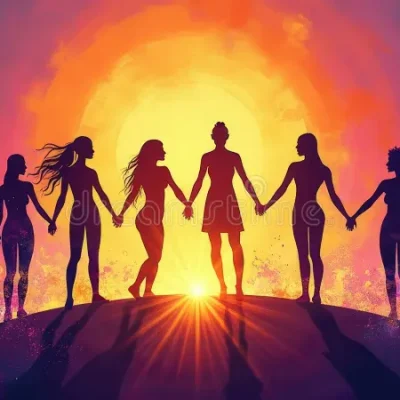Empowerment or Entitlement? A Critical Look at Manifestations of Contemporary Online Feminism
Have you ever heard someone say, “I know my worth! I won’t settle for less,” or “If he isn’t 6 ft tall making 6 figures, don’t even look my way”? These sayings have somewhat become a mantra for women today—a kind of symbol of confidence and self-assurance. But lately, I’ve been wondering: is this actually about knowing your worth, or has it turned into a sense of entitlement?
Setting standards is one thing, but these aren’t just standards—they’re requirements. I’ve heard this line everywhere, whether with peers or on social media. Despite the different variations, it’s usually delivered in the same tone that suggests any man who falls short isn’t even worthy of basic respect. It makes me wonder if some of us (mostly self-proclaimed “feminists”) are mistaking high standards for entitlement.

While these ideas are often labeled as femininity or empowerment, they’re frequently used to justify entitlement, double standards, and behavior that doesn’t align with what feminism actually stands for.
Feminism—the advocacy of women’s rights on the basis of equality with other sexes—was once a revolutionary force reshaping the world. It’s the reason we can vote, the reason we can speak our minds openly. But what began as a powerful movement rooted in equality has, in many corners of the internet, become something nearly unrecognizable. There needs to be an urgent conversation about how media—especially social media—is distorting feminism into a shallow, skewed version of what it once was.
Feminist movements have gone through many waves: from suffrage and legal rights in the late 19th and early 20th centuries, to addressing workplace inequality, reproductive rights, gender roles, and intersectionality. Each wave built upon the last, each pushing toward the same goal—equality. Not domination, not division, not hatred. Feminism was meant to create a world where women could stand beside men as equals. It was never about hating men, avoiding relationships, or playing power games. It was about choice, fairness, and dignity for all.
Fast forward to today—where TikTok hot takes and podcasts seem to speak for us. But as we all know, there’s always a dark side to media. Online feminism, especially when it goes viral, often drowns out real discourse. It gets reduced to clickbait and conflict. Movements like #MeToo were powerful—until they were co-opted by performative activism. Now, terms like “feminist” get twisted to imply misandry, bitterness, or emotional unavailability.
Even the idea of 50/50 relationships—something that sounds fair in theory—has become controversial online. Some see it as weak or emasculating. Others use it as a weapon to demand without giving.
You know what gets lost in translation? Mutual respect.
Feminism, to me, is about mutual respect—not dominating men. The empowerment behind feminism is rooted in self-awareness, not just self-prioritization. It’s about being strong enough to hold yourself accountable, treating others with dignity, and not tearing them down. It’s about being wise enough to understand that with power comes great responsibility.

a-person-holding-a-light-saber- Courtesy of Ato Aikins
Let’s be real: some of what’s being called “feminism” online today isn’t even empowerment—it’s just bad behavior hiding behind a hashtag. Weaponizing trauma, playing mind games, and treating people like disposable experiments? Just because “a man did it first”—that’s not justice, that’s misandry. Scrolling through TikTok for hours and building your entire personality around resentment isn’t activism. It’s being chronic online.
Feminism isn’t about copying the worst parts of patriarchy.
It’s about rising above—not getting even.
If your version of feminism requires you to become a villain to feel powerful, it’s time to take a step back and ask yourself:
What are you actually fighting for?









